For years, contract management has meant late, coffee-fueled nights spent untangling dense legal language to see how every clause could affect the business.
AI contract management changes that picture. Instead of combing through the legalese by hand, teams now rely on intelligent systems that read, compare, and organize contracts automatically. The expertise still comes from people — technology simply takes on the repetitive work that slows them down.
This guide explains how AI contract management works, why it’s essential for modern organizations, and what to look for when comparing tools. It also explores how monday service connects contract management with broader service operations from one flexible platform.
Try monday serviceKey takeaways
- AI contract management automates repetitive legal work. It uses artificial intelligence to read, compare, and organize contracts so legal teams can focus on strategic tasks instead of manual review.
- When teams use AI to manage their contracts, they gain stronger compliance, clearer visibility into obligations, and reduced exposure to risk — all while keeping human oversight in control.
- Choosing the right platform starts with clear goals. Security, governance, and scalability should guide your evaluation more than feature lists or pricing tiers.
- Responsible AI requires structure. High-quality data, clear guardrails, and transparent workflows build trust and accountability across teams.
- monday service brings everything together with AI-powered automation, digital workforce, and no-code flexibility that enables organizations to manage contracts and service workflows on one secure, connected platform.
What is AI contract management?
AI contract management uses artificial intelligence to automate the manual, repetitive parts of managing contracts — from creation to renewal. Instead of combing through every clause by hand, legal and procurement management teams use AI to review contract language, identify any risks or concerns, and ensure consistency against company standards. The result is a structured, data-driven approach to every stage of the contract lifecycle.
Key applications of AI in contract management include:
- Contract creation: Generates agreements from approved templates with standard terms automatically populated.
- Contract review and negotiation: Flags deviations from policy and highlights clauses that may need legal input.
- Clause identification: Detects and extracts key provisions like termination, liability, or governing law.
- Risk assessment: Compares contract language against internal playbooks to identify high-risk or missing clauses.
- Contract analytics: Converts unstructured text into searchable data for tracking renewals, expirations, and obligations.
- Compliance checks: Verifies that terms meet regulatory and organizational standards before execution.
- Version comparison: Highlights changes between drafts to check nothing’s missed during negotiations.
What are the benefits of AI contract management?
A recent industry report found that 74% of legal professionals now use AI for some part of their work — most often starting with document review or contract analysis. As adoption grows, the following benefits of AI contract management are increasingly clear.
- Faster cycle times: AI shortens contract reviews from days to minutes, accelerating negotiations and approvals.
- Reduced risk exposure: Automated checks catch non-standard terms, like unlimited liability or missing confidentiality clauses, before they cause issues.
- Stronger compliance: Built-in clause libraries enforce company policies and regulatory standards consistently.
- Improved visibility: Turning contracts into structured, searchable data helps teams monitor obligations and renewal timelines with confidence.
- Scalable operations: As contract volumes increase, AI maintains accuracy and performance without requiring additional headcount.
- Greater collaboration: Shared dashboards and automated notifications keep legal, procurement, and business stakeholders aligned throughout the process.
Together, these benefits create a faster, more accountable contract process — one that supports better business decisions and stronger relationships across teams.
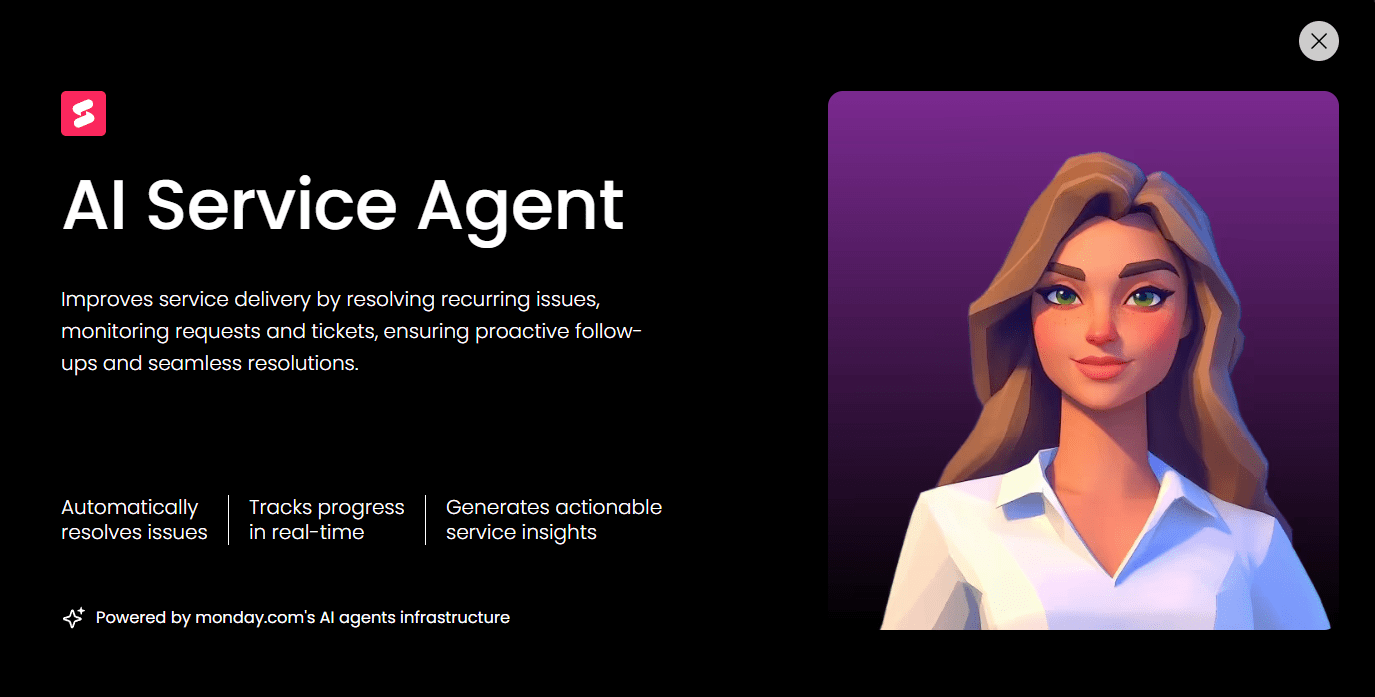
How to choose the right AI contract management software in 6 steps
The contract management software market has grown quickly and is expected to hit $4.66 billion in 2025 at a compound annual growth rate of 15.4%. But with so many new platforms and overlapping features, choosing the right system can be confusing. The best approach is to evaluate tools against your team’s real goals and daily challenges, not just their technical specs. Follow these steps to pick the best of the bunch.
1. Define your needs
Start by clarifying what you need AI to accomplish. For most organizations, the priority is security, governance, and legal compliance, so your sensitive data stays protected and every contract aligns with company policy and regulations. Others may focus on efficiency or cost savings, for example.
To determine what is important to your organization, you might use the SMART goal-setting framework to define goals that are specific, measurable, achievable, relevant, and time-bound to guide your evaluation. For example:
- Meet all internal security and audit requirements for contract storage and access by Q3
- Reduce average contract review time by 40% within 6 months
- Cut missed renewal deadlines to under 2% of contracts within the next quarter
2. Select your core capabilities
Once your goals are clear, look closely at the capabilities that make AI contract management effective. The right software covers the entire contract lifecycle, from drafting to analytics, while giving your legal and procurement teams confidence in its accuracy and security.
A platform combining the following core capabilities builds a single source of truth for how contracts are created, reviewed, and governed across the business:
Clause library and playbook support: Stores approved clauses, fallback options, and negotiation guidance so every contract follows company standards.
- Native auto-redlining and explanations: Automatically compares new agreements to your standard terms and highlights differences, complete with short explanations that help reviewers understand the impact of each change.
- Change tracking and version comparison: Keeps a precise record of every edit so legal teams trace how language has evolved during negotiations.
- Compliance and risk scoring: Assesses each contract against internal and external regulations, flagging high-risk clauses or missing terms before approval.
- Analytics and reporting: Converts contract data into insights on cycle times, renewal rates, and obligation management, helping leaders measure performance over time.
- Integration APIs and connectors: Allow contracts and related data to flow smoothly between your CRM, ERP, and document management tools. This keeps teams aligned without duplicate entry or missed updates.
- Data security, audit trail, and governance: Protects sensitive information with role-based access, encryption, and full audit logs for every change or approval.
3. Test ease of use
Even the most advanced AI system won’t deliver value if your teams avoid using it. When evaluating platforms, focus on how easily people across departments might adopt the tool and keep it running without constant IT support. A practical AI contract management platform should offer:
- Simple embedding and synchronization: The ability to embed or sync directly with your existing workspaces. This keeps contract updates visible to everyone involved.
- Trigger- or event-based workflows: Contracts often connect to larger projects or service tasks. Look for tools that let you automate next steps, for example, starting a renewal process when a contract reaches its end date or notifying finance when an agreement is signed.
- Two-way updates: When contract status changes in the AI system, the same change should appear in your connected platforms, and vice versa. This prevents confusion and keeps every stakeholder working from accurate, current information.
- Low-code flexibility: Legal teams shouldn’t have to rely on developers for every adjustment. Low-code or no-code customization makes it easier for non-technical users to modify workflows, add fields, or create new reports as needs evolve.
4. Determine scalability
Imagine a scenario where your current contract volume doubles or trebles within a year. Will your platform be able to handle that growth without slowing performance or requiring complex infrastructure changes?
Ask potential vendors about user limits, data storage capacity, and performance under heavy loads. Scalable architecture and flexible licensing will save you from costly migrations as your organization expands.
5. Evaluate the quality of customer service
Contracts are long-term commitments, and so is your relationship with the software provider. Investigate the vendor’s financial stability, security certifications, and product roadmap. Frequent updates and transparent security practices are both strong indicators that the company will remain a reliable partner over time.
Community feedback is another rich source of feedback. Browse G2 reviews, customer case studies, and independent testimonials to see how the platform performs in real settings, including how responsive support is and what customers highlight as strengths. As an example, monday service achieves a score of 4.7 out of 5 with the G2 community, which is indicative of the quality of support, ease of use, and value for money offered.
6. Understand the pricing
Pricing models in AI contract management software vary widely. Some charge per contract, others per user, and many use subscription tiers based on features or data volume.
When comparing options, consider both current needs and future scale. A slightly higher base price might be worthwhile if it includes unlimited contracts, advanced analytics, or dedicated support. Be sure to understand any additional fees for integrations, storage, or AI usage credits before signing.
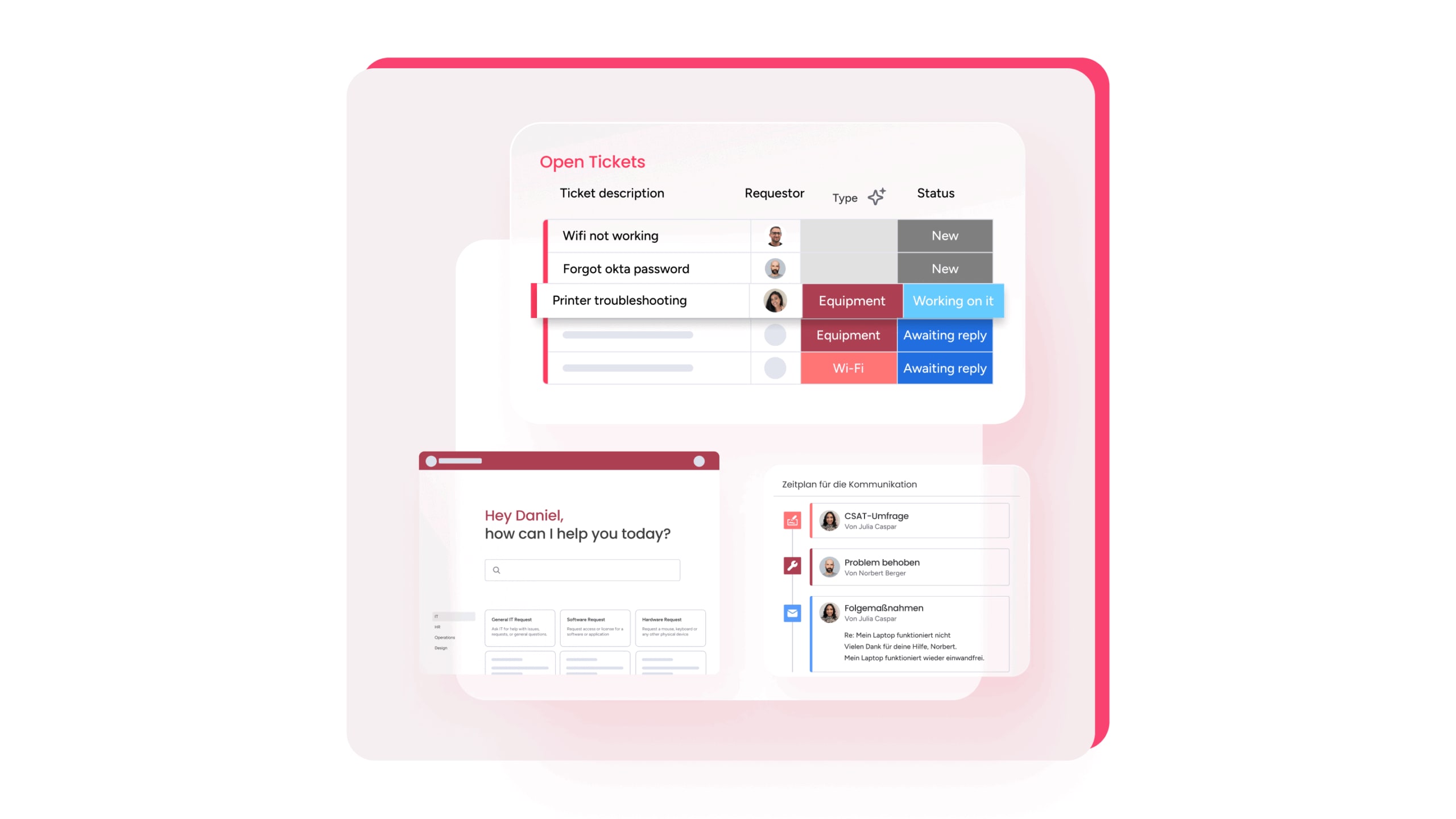
5 AI contract management software tools
It would be the understatement of the century to say that adoption of artificial intelligence is growing quickly. To be more specific, analysts predict that 50% of organizations will use an AI tool to support their contract negotiations by 2027.
Below are 5 leading platforms that reflect the range of options available in 2025, from dedicated legal tools to all-in-one workflow systems.
1. monday service
Best for: enterprise teams that want to connect service operations, contract workflows, and AI-driven automation from one customizable platform.
monday service is an easy-to-use service management platform that brings ticketing, projects, and cross-department collaboration together. Its built-in AI capabilities help organizations handle service requests, approvals, and contract-related workflows faster and with greater visibility. The platform is designed for flexibility, from automating document routing and service level agreement (SLA) tracking to integrating directly with tools like DocuSign, Outlook, and Azure DevOps.
Key features
- Unified contract visibility
- AI-assisted workflow customization
- Enterprise-grade data protection
Pricing
- Pricing starts at $26/seat/mo
- 3 plans available: Standard, Pro, and Enterprise
- 14-day free trial available
What users say
Try monday serviceWe as a company are more connected and the visibility into where we are in the development of a project is unmatched. When everyone buys in to use the program, it truly does allow all members to be connected in a way that meetings can’t provide. — Danielle G.
2. Legly
Best for: small to mid-sized businesses that want quick, affordable AI-powered contract review
Legly is a cloud-based AI platform built to simplify contract review and analysis. It helps legal and business users understand what’s inside their agreements by quickly highlighting key clauses and potential risks. Designed for accessibility, it suits organizations that want reliable contract insight without the setup or maintenance of enterprise-grade systems.
Key features
- Automated clause detection
- Metadata extraction
- Portfolio analysis
Pricing
- Paid plans start at $29 per user/mo
- 2 paid plans available: Professional and Enterprise
- Free version available for 2 contract reviews every 90 days
What users say
“Legly gives me immediate feedback on my contracts so I can get back to my counterparts quickly. It saves me both time and money and I am sure that I have not missed any details.” — Thomas S., a small business user
3. Evisort
Best for: large organizations requiring deep AI capabilities
Workday has acquired Evisort, an AI-native document intelligence platform. It helps legal, finance, and procurement teams manage the full lifecycle of agreements, from drafting and negotiation to storage and analytics, all within a secure, integrated environment. Evisort’s proprietary language models are trained on millions of legal documents, giving users detailed insight into clause language, risk management, and compliance gaps.
Key features
- AI-powered clause analysis
- Seamless Workday integration
- Advanced search and reporting
Pricing
Accurate pricing is available from the vendor on request.
What users say
“I especially like that you’re able to sync Evisort to your Google Drive and contracts are immediately imported into Evisort. The repository couldn’t be easier to search.” — a mid-market IT user
4. Juro
Best for: teams that want an all-in-one workspace for contract creation, negotiation, and e-signature
Juro is a contract collaboration platform that brings every stage of the contract process into a single environment. Legal and business users can draft, edit, negotiate, approve, and sign agreements in one shared workspace, eliminating the back-and-forth between Word documents and email threads.
Key features
- Collaborative editor
- AI-powered clause analysis
- Integrated e-signatures and contract repository
Pricing
Accurate contract-based pricing is available from the vendor on request.
What users say
“Juro is very easy to implement with our business colleagues, and allows for significant flexibility to draft, negotiate and archive contracts. I particularly appreciate enabling business partners to manage contracts independently with limited guidance from the legal department.” — Serena B., legal counsel
5. DocJuris
Best for: legal and procurement teams that rely on structured playbooks and need consistent contract redlining.
DocJuris is a contract review and negotiation platform built around team playbooks and clause libraries. It helps users review, redline, and approve contracts quickly by comparing proposed language against company standards.
Key features
- Playbook-driven review
- Collaborative redlining environment
- Clause analytics
Pricing
Accurate pricing is available from the vendor on request.
What users say
“DocJuris’s playbook helps anyone review and redline clauses within a contract. They save time by not having to constantly go back and forth between playbook and contract redlining and storing pre-written clauses.” — A verified wholesale user
5 best practices for using AI in contract management
While AI can dramatically speed up and strengthen contract management, it also introduces new risks you must manage thoughtfully. Below are 5 best practices to help your teams embrace AI safely and effectively.
1. Keep humans in the loop (always)
AI can flag risky clauses or suggest edits, but it can’t yet grasp legal nuance, business context, or negotiation intent. Overcome this by designing workflows where human reviewers are always involved in key decision-making moments.
Best practice: Use AI for triage and prioritization, but assign humans to sign off on the final stage of your approval process.
2. Train and validate with high-quality, relevant data
AI models are only as good as the contracts and feedback they learn from. It follows that poor or unrepresentative training data can create significant bias or even miss jurisdiction-specific nuances.
Best practice: Keep your outputs contextually accurate by periodically retraining or fine-tuning models with your organization’s own approved contracts and clause libraries.
3. Build guardrails against “overtrust”
Time pressure can make it easy to accept AI suggestions without proper review. But false positives and negatives happen time and again. For example, an AI model might flag a harmless clause like “termination for convenience with 30 days’ notice” as risky (a false positive) because it’s unfamiliar with your organization’s standard terms. On the other hand, it could miss a subtle change that shifts liability from a vendor to your company (a false negative) if that variation isn’t reflected in its training data.
Best practice: Continuously improve your model by establishing review thresholds (e.g., any contract with a “high-risk” flag must be manually reviewed) and require users to confirm or reject AI recommendations.
4. Prioritize security, privacy, and compliance
Contracts are among the most sensitive data assets an organization holds. Keep your information secure by making sure your AI solution:
- Encrypts data at rest and in transit
- Limits access by role
- Complies with privacy and governance standards such as GDPR or the upcoming EU AI Act
Best practice: Support compliance and accountability by retaining a clear audit trail of AI interactions; for example, who reviewed, accepted, or overrode suggestions.
5. Manage change and build trust across teams
Legal operations teams often hesitate to rely on AI until they understand how it reaches its conclusions and what safeguards are in place. Transparency is essential here — users should know why AI flagged a clause or calculated a risk score.
Best practice: Start small with low-risk contract types and provide clause-by-clause explanations describing how AI reached its conclusions.
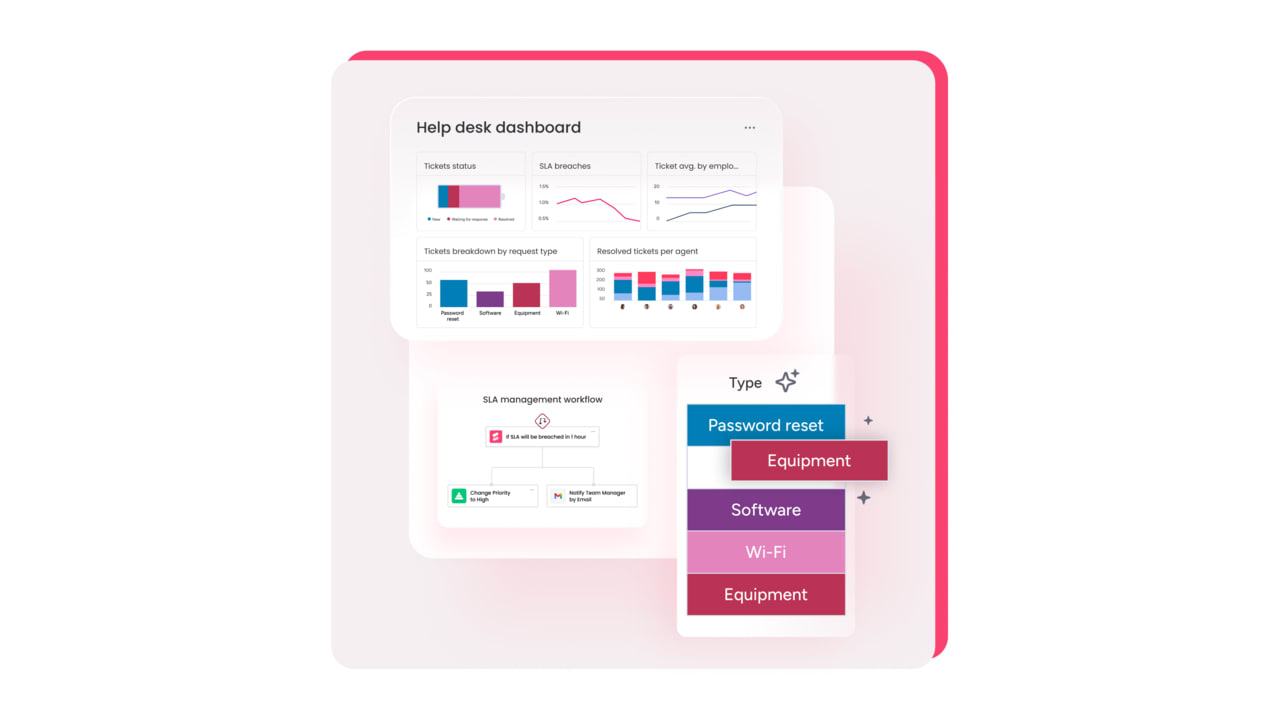
Harness the power of AI contract management in monday service
In a crowded field of AI contract management solutions, it’s rare to find a platform that combines ease of use with enterprise-level capabilities. Trusted by 220,000+ customers worldwide, monday service does both, connecting every moving part of your organization in one intuitive, customizable space.
It’s the service platform that powers every team and process, offering unparalleled ease of use, no-code flexibility, and powerful AI workflow automations. Whether handling contract approvals, managing SLAs, or tracking cross-departmental projects, monday service delivers a complete view of your operations. Here are the specific AI contract management benefits you’ll appreciate.
See every contract and service workflow in context
With monday service, contracts, tickets, and related projects all live in one connected workspace. Teams track every agreement from draft to renewal using 27+ views, 36+ column types, 25+ widgets, and access to 217+ apps, all designed to make complex service and contract data easy to interpret.
Switch between a Table View for clause-level details, a Timeline or Kanban View to monitor contract progress, or a Dashboard widget to visualize points like SLA compliance in real time. Custom columns capture contract value, counterparty, risk score, or review status, automatically updated through integrations and AI-driven workflows.
And with 72+ native integrations, every contract connects to the wider business context, from CRM and asset data to procurement requests and approvals. The result is complete visibility across departments, with everyone working from the same live source of truth.
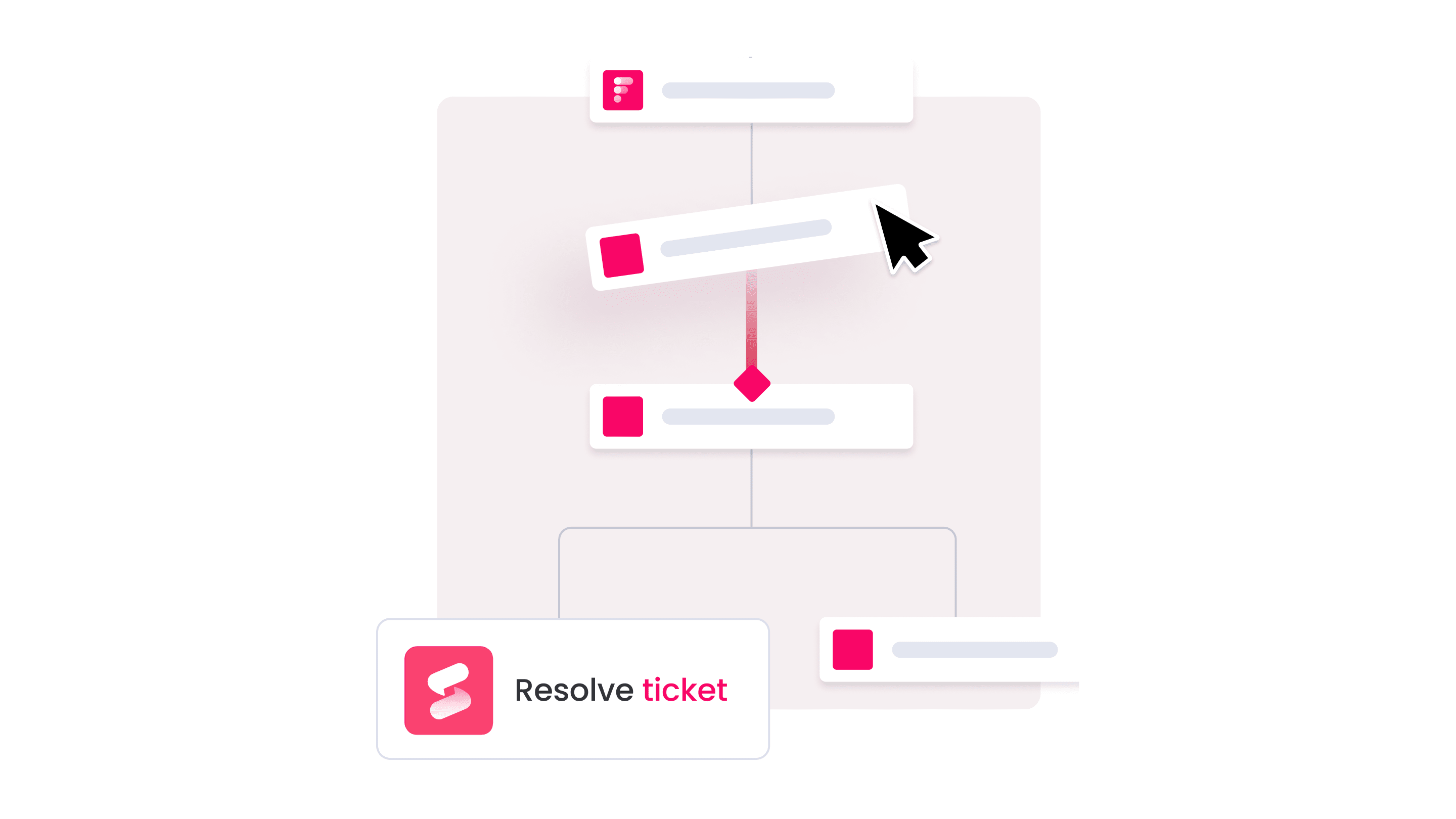
Make smarter decisions with AI-powered insights
monday service brings intelligence into every stage of the contract workflow. Its AI features help teams analyze data and spot risks and trends that shape better decisions, from renewal forecasting to compliance reporting.
Paired with monday.com’s Digital Workforce, those insights turn into action automatically. Digital Workers act as proactive AI specialists that monitor contracts, flag potential issues, then take corrective action. They keep your operations running smoothly, 24/7, while learning and improving over time.
Personalize every interaction at scale
monday service helps organizations deliver service and contract experiences that feel personal, even when handling thousands of requests. Built-in AI Blocks like Detect Sentiment, Assign Labels, and Summarize interpret tone, urgency, and context to tailor responses automatically. Routine updates can be drafted or adjusted by AI, while escalations trigger customized workflows based on priority or stakeholder.
Teams enhance those interactions further, connecting every conversation to the right data source, whether a vendor profile, CRM record, or change request. The platform can even pre-populate names and details, keeping every communication relevant and informed without added manual effort.
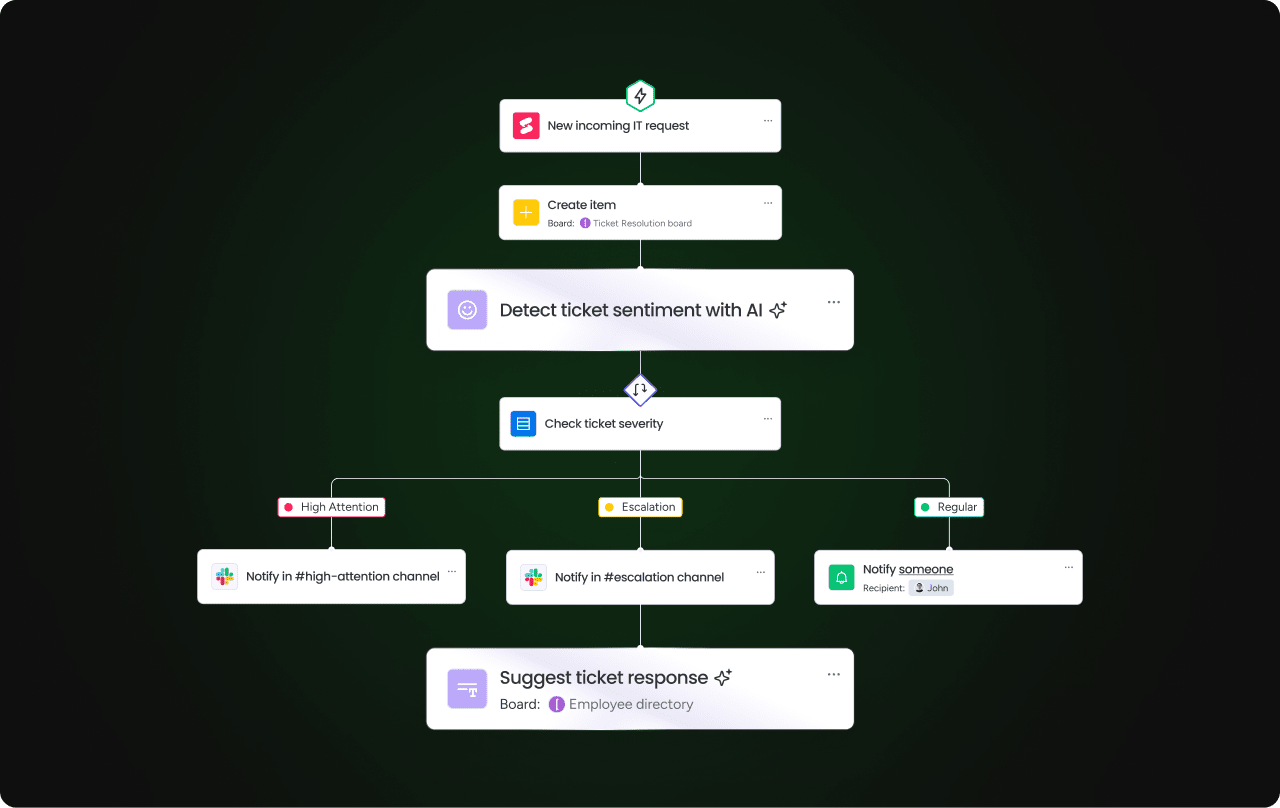
Adapt and grow with a platform built for change
The way you manage contracts today will look different a year from now. AI capabilities are advancing rapidly, and the systems that support your business need to evolve just as quickly.
monday service was built for that kind of agility. Its no-code environment and flexible workflows let teams adapt to new compliance rules, contract types, or approval processes in minutes, without disruption or complex setup. As your organization grows, monday service scales effortlessly to keep every workflow connected and aligned.
See how seamlessly AI can fit into your contract management by starting your free trial of monday service today.
Try monday serviceFAQs about AI in contract management
How can AI help with contract review and analysis?
AI helps review and analyze contracts by automatically scanning documents for key clauses, risks, and deviations from standard terms. It allows legal teams to complete first-pass reviews faster and focus on strategic decision-making.
Which types of businesses can benefit from AI contract management systems?
Any business that handles high contract volumes can benefit from AI contract management. Legal, procurement, IT, real estate, and finance teams save time and achieve compliance, making them valuable for both growing companies and large enterprises.
What are the main benefits of using AI for contract lifecycle management (CLM)?
AI improves contract lifecycle management by giving organizations better visibility into contract performance and risks, helping teams make data-driven decisions throughout drafting, negotiation, and renewal.
How does AI help with identifying risks in contracts?
AI identifies risks in contracts by comparing language against approved clause libraries and regulatory requirements. It flags risky or missing terms, such as unlimited liability or unclear termination rights, allowing reviewers to address potential issues before signing.
Can AI assist in the negotiation phase of a contract?
Yes, AI can assist during contract negotiation by highlighting deviations from preferred terms, suggesting alternative clauses, and summarizing key points for both parties. It supports quick, informed discussions while maintaining legal and compliance standards.
How is generative AI different from traditional AI in contract management?
Traditional AI focuses on recognizing patterns, extracting data, and scoring risks. Generative AI goes further by drafting or redlining contract clauses and suggesting alternative language based on context, helping teams accelerate negotiations and improve accuracy.
How does AI improve contract compliance and audits?
AI improves compliance and audit readiness by maintaining a clear, searchable record of contract changes, approvals, and risk scores. It automatically checks clauses against internal policies and regulatory standards, giving you confidence that every agreement meets current legal and governance requirements.